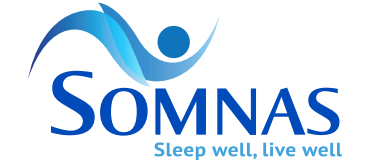What is Obstructive Sleep Apnea Syndrome (OSAS)?
When you have OSAS, you stop breathing for short periods of time during sleep, often without even being aware of the disruption. You may not be getting enough oxygen when you sleep and may not sleep soundly.
What causes OSAS?
As you sleep, all of your muscles relax. In people with OSAS, this relaxation allows the airway in the back of the throat to become narrow, interfering with breathing and putting your health at risk. Several factors can contribute to OSAS: a very small jaw, overbite, enlarged tonsils, or tissues that partially block the airway. Sleeping pills, alcohol, and tranquilizers taken at bedtime can also make the throat more likely to collapse during sleep. OSAS most often occurs in overweight men.
What do you need to know?
There are some warning signs of OSAS that may appear gradually:
- Loud snoring or a pattern of snoring with pauses.
- Excessive daytime sleepiness.
- Falling asleep at inappropriate times.
- Difficulty concentrating, irritability, forgetfulness.
- Impotence or menstrual irregularities.
- Headaches or nausea upon waking.
- Frequent nighttime urination.
Untreated, OSAS can also result in high blood pressure, heart attack, depression, or stroke. Ask yourself:
- Do I snore most nights?
- Is my snoring loud?
- Do I stop breathing or gasp in my sleep?
- Is my collar size 17″ or more?
- Do I have high blood pressure?
- Do I occasionally doze or fall asleep during the day?
- Do I occasionally doze or fall asleep when driving?
If you answered yes to four or more questions, you have a high probability of a sleep disorder. If you answered yes to two to four questions, you may be at risk.
How is OSAS evaluated and treated?
If you, or family members, have noticed signs of OSAS, call your doctor. You may be referred to a sleep center where your sleep patterns can be studied. If diagnosed, you may benefit from specific treatments. A highly effective therapy is continuous positive airway pressure (CPAP). Air is gently forced through the nasal passages and down the throat with the aid of an air compressor and a small sleep mask. Oral appliances or surgery may be additional treatment options.
How can you get a better night’s sleep?
Some general guidelines in lifestyle/routine may help:
- If overweight, start a healthy weight loss program.
- Avoid alcohol and caffeine within four hours of sleep.
- Lie on your side or stomach, not your back.
- Establish a regular bedtime and wake-up schedule.
- Have a relaxing pre-sleep ritual.
- Go to bed only when you are drowsy.
- Exercise regular.
- Don’t nap.
Ready to breathe better as you sleep?
Contact us today or call (239) 437-6670.
- CPAP Patient Instruction
- Getting A Better Night’s Sleep
- Insomnia
- Restless Leg Syndrome
- Sleep Diary
- Sleep Education – Sleep Disorder and Sleep Health

